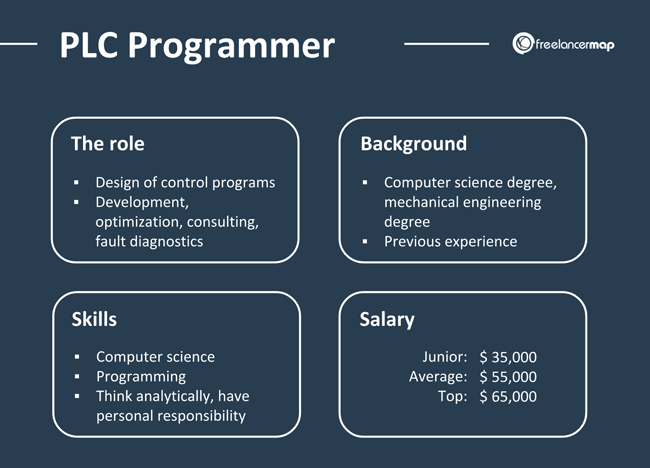PLC programmers often work in electrical engineering and IT companies and are responsible for the maintenance of machines and plants that use programmable logic controllers. Learn more about these professionals and their roles.


The job profile
PLC programmers work with programmable logic controllers (abbreviated to PLC). These are small computers that have inputs and outputs, a built-in operating system and interfaces through which user programs can be loaded.
A PLC is connected to a machine and controllers its desired functions. These can be light barriers, temperature parameters, and other measuring devices.
PLC gets information through inputs (relays, sensors, etc.) and interacts with outputs (engines, valves, conveyor belts, etc.). E.g. if the temperature is above the desired level of 30 degrees, then switch an engine off.


Looking for a PLC programmer?
Responsibilities and tasks
A PLC programmer designs control programs for electrical machines and systems, mostly in the industrial sector and seeking to automate processes. For example, programmable controllers are used to controlling machinery on factory assembly lines in the automobile industry.
PLC programmers develop and optimize processes and also perform maintenance and fault diagnostics once the process has been implemented.
Often they also work on ways of visualizing the processes taking place in order to increase the operability of a given system.
They also work in sales and provide customer service and training to clients. They’re in charge of informing clients regarding the use and application of PLC systems and also of advising the clients on possible conversions. The complexity of the PLC systems varies depending on the project and company.
What tasks does a PLC programmer do?
- Design of control and regulation programs
- Development and optimization
- Maintenance and execution of fault diagnostics
- Visualization of processes
- Customer consulting in sales
Find PLC programmers on Freelancermap.com.
Looking for a new job?
Skills
PLC programmers have a wealth of knowledge in the field of computer science and programming skills. They master common programming languages. In terms of soft skills, they are able to work structured, think analytically and have a high degree of personal responsibility. Good English skills are usually a prerequisite for a job.


What must a PLC programmer be able to do?
- Relay Ladder Logic
- Programming
- Knowledge of control programs
- High sense of responsibility
- Autonomous work
PLCs are becoming more intelligent and are used in computer networks. There exist many proprietary types of networks. One type is widely known as SCADA.
Background and requirements
PLC programmers typically hold a degree in the fields of computer science, mechanical engineering or electrical engineering. People getting into automation and control engineering often come from Electrical Engineering degrees.
There is no direct training or degree program that trains you as a PLC specialist. The path leads either through one of the above-mentioned subjects or via a vocational further training as a PLC specialist.
Salary
The starting salary is around €35,000 per year. Experienced PLC programmers achieve an annual salary of up to €65,000. The average remuneration is around €55,000. The fluctuations are, as in every role, related to the educational degree, the industry, the company, but also the location.
| Junior | $ 25,000 |
| Average | $ 55,000 |
| Senior | $ 65,000 |
| Average rate PLC Programmers (2022) | $66/hr |
According to freelancermap’s price and rate index in September 2022, freelance PLC Programmers charge $66/hour on average.
Freelance rates in PLC Programming range between $36 and $89 for the majority of freelancers.
If we consider an 8-hour working day at $66/hour, the daily rate for freelance PLC Programmers is around $528/day.

